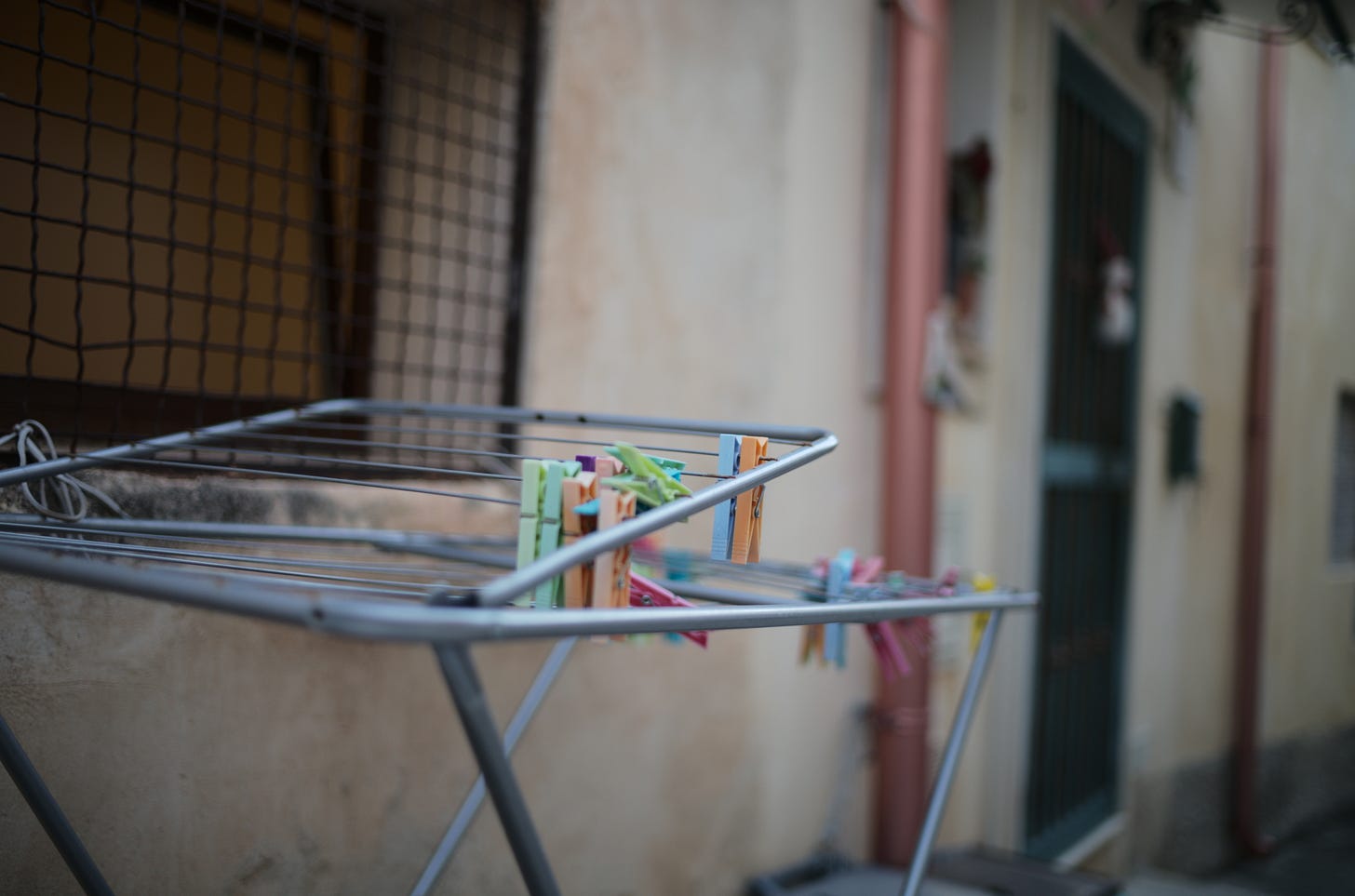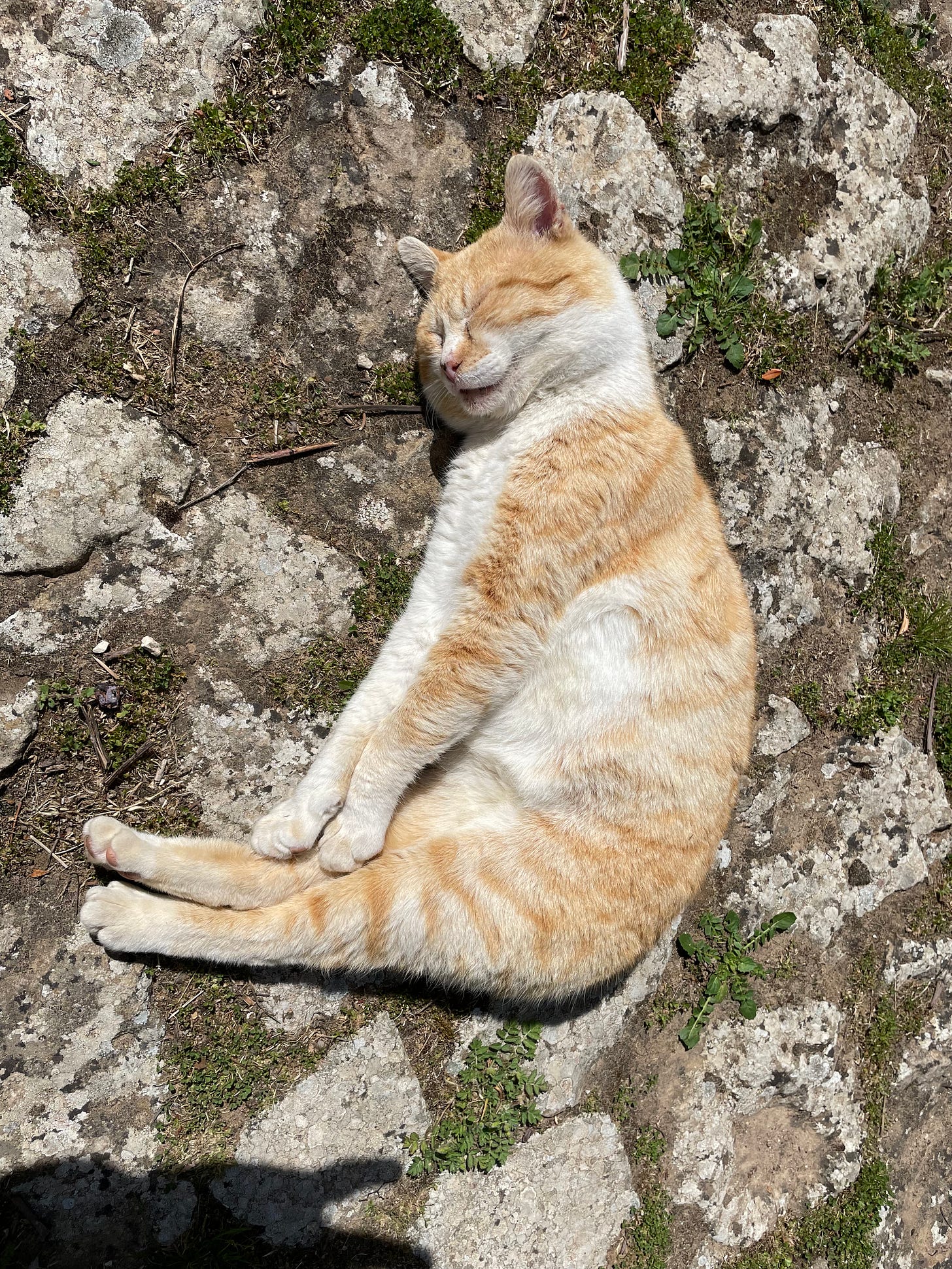Trouble? It’s a vague topic, I admit. “Trouble” as in difficulties, problems, obstructions. Trouble in general? All of it? Yes. You lost your job. Your family is unraveling. Your country is unraveling. Your tax return is being audited, your sinus infection is killing you, your neighbor is furious, you’re lonely, your sister has cancer, your roof is leaking, your computer is malfunctioning, you don’t have a computer, what you said was humiliating, ICE is escalating fear in your neighborhood, your town’s water is toxic, people at work are treating you like you’re toxic. Obviously, this list has no end, from enormous troubles like war or famine to the smallest stubbed toe or mistake.
The focus of my writing today is this, that although all particular troubles have particular solutions, there are overarching skills that can be cultivated that do in fact enhance the quality of responses to difficulties in our lives and that, as a consequence, enhance the quality of our lives. Typically, of course, we respond to problems as we always have. Instinctually we attack them, overthink them, ignore them, deny them, or whatever. We think about the problems but not about the way we think about problems. But in fact, problem solving can be consciously cultivated as a personal art form, a set of skills for facing troubles in life that can be developed. Even though all of us already have an established way of facing troubles, that “way” may be an additional source of trouble in our lives. The point of my writing, then, is to offer the suggestion that there are better and worse ways to face trouble, and that it is possible to transform deficient strategies into better ones.
The first barrier to skillful problem solving is the idea that problems are an aberration, something that should be eliminated altogether. But there is no such thing as a trouble-free life. On the contrary, there are probably as many troubled times in life as trouble-free times. It is crucial, then, to recognize and to accept that there will always be trouble—things will not always go as we had assumed or planned. Some of these troubles are self-caused, others have numerous other causes not directly under our control. But those causes and the troubles that result from them will always be there in our lives from birth all the way through death even though we continually strive to avoid them. Unless we accept this basic fact, the problem we’re facing is exacerbated by the resentful character of our response to it. We resent the problems that disrupt our carefully laid plans and the normal course of our lives. We want and expect life to be a smooth ride on a straight path. But that never happens. Not for you or anyone else.
Imagine a novel or a film that isn’t about people facing trouble. My best guess is that there aren’t any, and even if there were, we’d be bored to tears because problems are at the heart of human experience. Now imagine yourself as the star in a film about someone who goes to great lengths avoiding trouble in life. You avoid doing anything new or difficult and keep all potentially frustrating effort to a minimum. You reduce or eliminate all human contact, the source of endless problems. You minimize and avoid family and friendships. You isolate yourself as far as possible. Having done that there are many typical problems that you would in fact avoid. The cost of that avoidance, however, is huge. It requires a massive contraction of life, an avoidance and reduction of many experiences that make human life as compelling as it is. So, although “less life” may lead to “less trouble” the price you pay for that drastic reduction is enormous. It approaches the tragic feel of suicide. It’s important to admit, though, that all of us make some moves in that basic direction. We avoid risks and complications that in retrospect we wish we had taken. The question for each of us is how far do we go in reducing our life potential in order to avoid trouble?
We have all developed particular patterns of response to troubles in life, and very frequently these patterns are not consciously known to us. They are largely and often unexamined. We just do what we have habitually done in response to difficulties, and because these are points in life that are highly emotional, we can’t or don’t step back to assess how we’ve handled them. We fear these trouble spots in life and react through built-in defense mechanisms. Fear signals some form of danger, whether physical or personal or emotional, and through deep evolutionary roots, this fear demands a response. When fears arise, emotions take over and thought is habitually pushed into the background. The capacity to step back from fear and other strong emotional states to thoughtfully consider how best to respond is a very high-level personal skill. When it has been cultivated, however, its value in life is enormous.
Profound emotional reactions to troubling situations—like surrender, anger, regret, self-blame, fear of failure or injury—sweep over our lives like tsunamis. They overwhelm us and then pass right on by. Even though these emotional tidal waves always recede, typically without doing the damage that we fear, they are so powerful that we often fail to learn how to realize in the moment that they are temporary and that, as almost always, “this too shall pass.” Emotional reactions to trouble tell us something important—there is indeed danger ahead—but the intensity of the emotion typically exaggerates and misconstrues what that danger is.
Recognizing that familiar tendency and learning to take it into consideration as we face trouble helps us cultivate a growing freedom from our habitual default responses, freedom to make intelligent moves in problem solving that aren’t just habit. It’s important not to deny the fear, regret, or other strong feelings that arise because these emotions are truth tellers. They force us to see a situation ahead that will require a serious response. But recognizing and carrying out a healthy response to the problem requires that we put that truth in context. Emotions are a fundamental dimension of our human constitution; the more we can allow them into our lives the larger and more human our lives will be. But when these emotions overwhelm other essential human capacities, we make ourselves smaller and more vulnerable.
This freedom from immediate habitual response gives us some room to maneuver in difficult situations. It opens our minds to response possibilities that in the grip of emotional habit we would never have seen. Developing this ability to be fully present to the problem without immediately yielding to default moves gets us just enough elbow room to work with the trouble at hand with creativity and an open mind. That one step back from automatic response reflexes can help us soften our judgments about other people, moderate our harsh self-judgment or fear, and recognize creative solutions so that we face the problem with real options and the personal agency to choose.
How is it possible to develop that small space of freedom? Through practice, of course, like everything else we seek to master. But in this case practice in the midst of significant trouble is very difficult, even unlikely. Going over any troubling crisis in retrospect, however, we can see what might have been done and work this new, more creative option over in our minds so that it could possibly emerge in an actual crisis. You practice it by repeating it internally. In anticipatory practice you can imagine yourself facing a problem in a more relaxed manner. You can practice being patient enough to scan through a variety of possible responses. You can practice resisting the default habit that you have always adopted in the past without reflection. You can practice seeing how this problematic situation looks from the perspectives of others. Just working any of this through your imagination and repeating it until you’ve got the feel of it—until it begins to feel like a natural option that would be open to you even in a crisis setting—that would change your life. With practice you can see creative possibilities that weren’t in view before and guide yourself past old default non-choices into a more mature way to face trouble. With practice it is possible to create new patterns of engagement with the various problems that come up in our lives.
The key to effective practice is intention. What do we intend? Anything at all? Or are we simply relying on habitual patterns to see us through trouble? Intention is a decision and a vow. It is a plan that we have chosen and the resolve to put it into action. Before we can seriously intend some course of action that alters unhealthy patterns, we must have scrutinized the motivations that have guided us in the past. What is it that propels us to respond the way we do? With that in mind we can form an intention about how we might respond differently to troubling situations. By working this intention through our minds repeatedly we begin to reroute the ingrained neurological patterns in our brain. A firm intention is both the point of departure for change and the compass or stabilizer to which we can return to stay on track.
A conscious intention enables turning toward the problem before us rather than away from it—to avoid denying it, or pretending it isn’t really there, or folding in fear of it, or infantilizing ourselves by telling ourselves that there are no solutions. The capacity to relax in view of trouble just enough to give us a little time and space to deal with the complexities of the challenge—that capacity is enormously consequential. We have all witnessed people who somehow manage to do that. Their strengths are profoundly admirable. Developing the skills to face problems consciously with the freedom to make thoughtful moves takes practice. Lots of practice. Without the sustained practice of difficulty, we will continually fall back into habitual responses that lack insight and maturity.
We began by claiming that the first step toward a free and mature pattern of responses to trouble is getting over the inevitable thought that problems are aberrations, that the troubles interrupting our everyday course of life just shouldn’t be. That resentment stands in the way of our understanding deeply that problems are as basic to human life as non-trouble. They have important roles to play in our lives since they are intrinsic to human experience. Because there is no such thing as a trouble-free existence it is wise to consider how best to deal with them.
The fact that troubles will arise throughout life is not the problem. The problem, more likely, is the quality of our response to trouble.
There are people who right now face troubles of almost unimaginable proportions. Some of them live in war zones where violence and death are right before their eyes every day. There are people who live in countries with insufficient food; they watch helplessly as the villagers around them starve to death and as they are pushed toward that fate themselves. There are people with incurable diseases, both old and young, and people who live without any external freedom under violent racist regimes. Those of us who live in some degree of comfort, hope and pray that we never face that level of trouble in life. But we’re all vaguely aware that it could conceivably happen, right here, at any time.
Of course, we don’t know ahead of time whether any amount of advance practice in dealing with problems would get us through that level of terror. Maybe or maybe not. But at the very least it helps us viscerally understand the spiritual depth of the war zone villager who stands tall, proud, and free right to the end, or the Nazi deathcamp prisoner who shares her last piece of bread with the collapsing prisoner next to her. That freedom is the highest human achievement I can imagine. It evokes in all of us a profound sense of admiration and awe.








